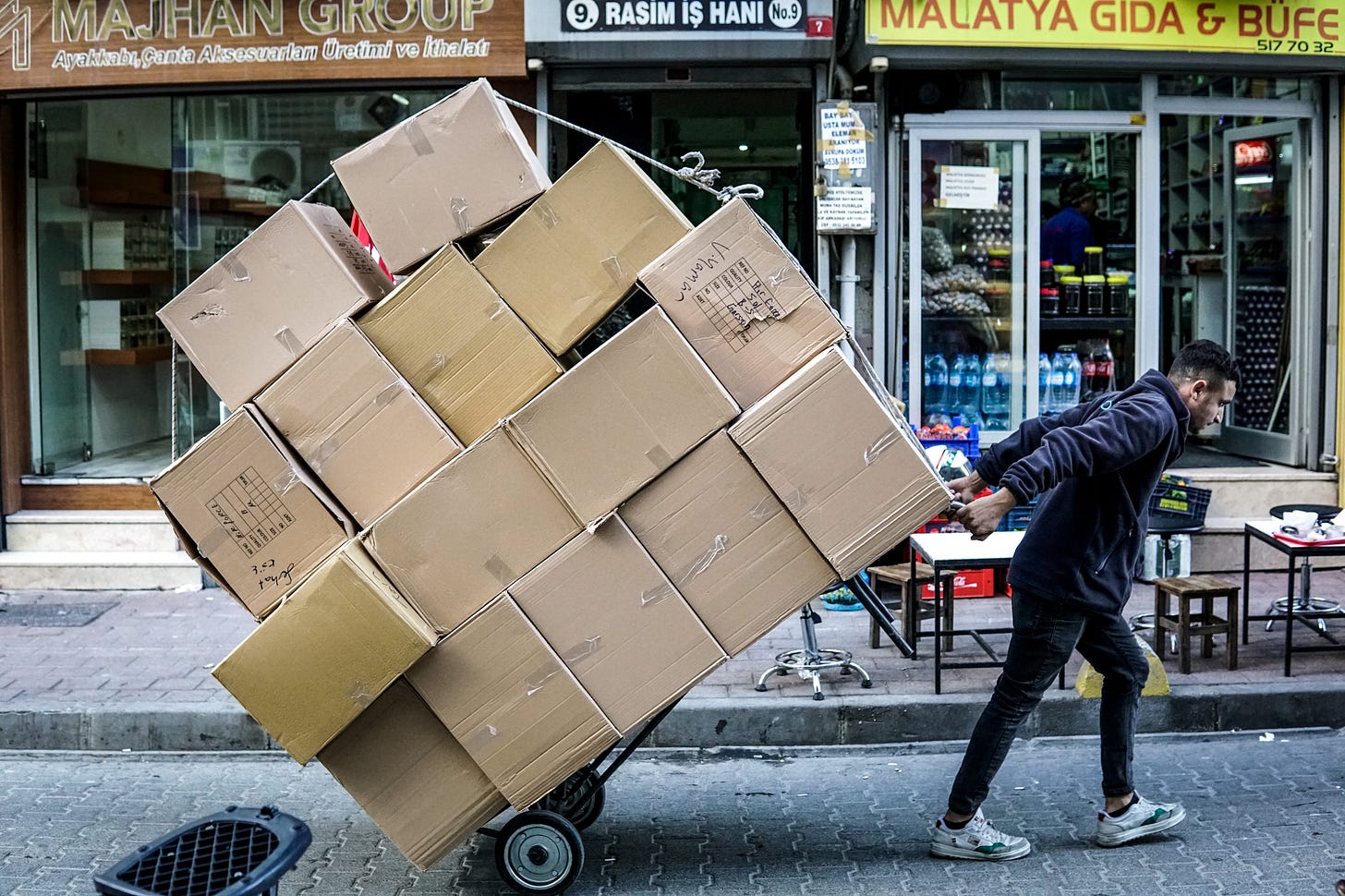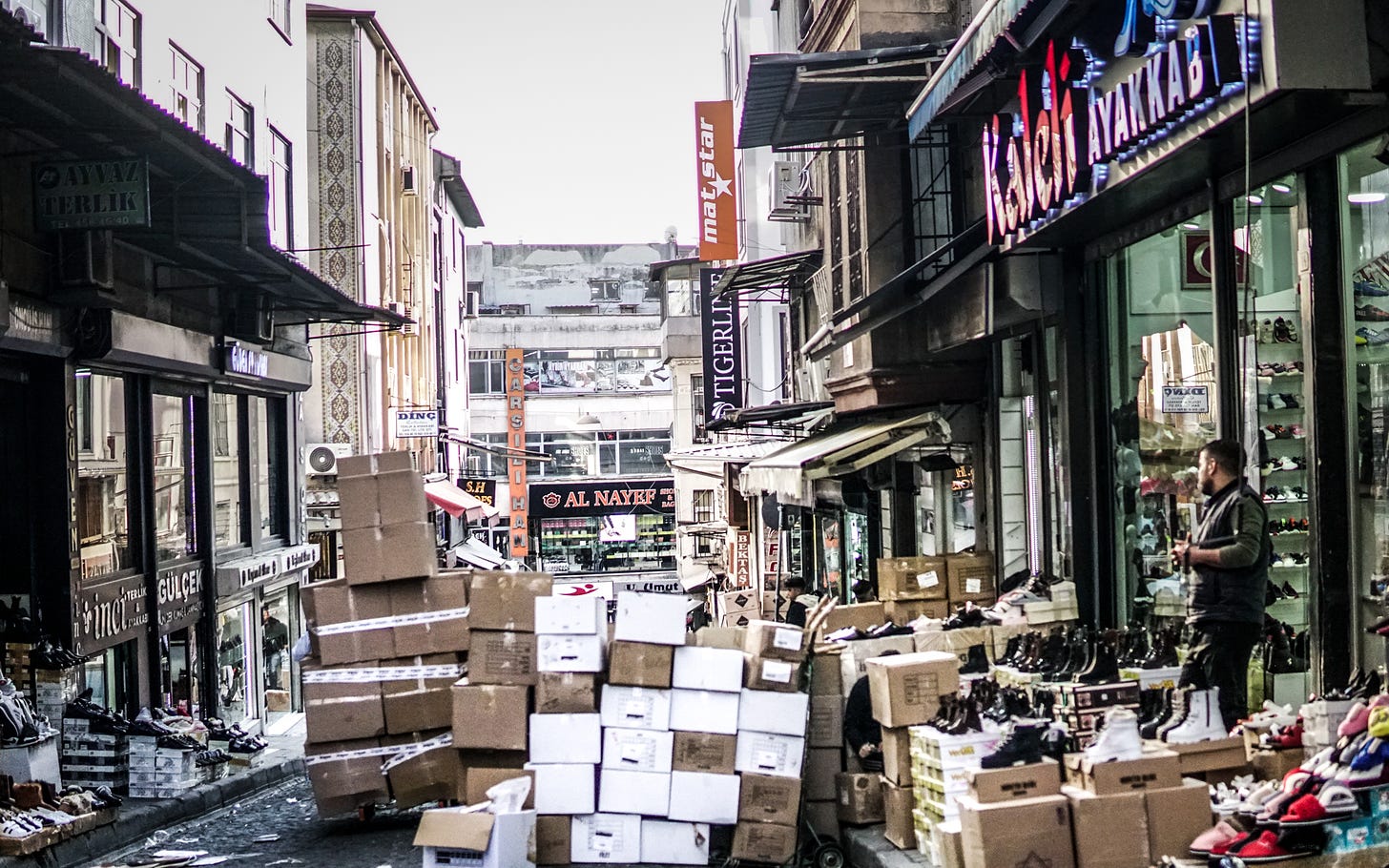What If Capitalism Is Not The Enemy?
We call back our power when we recognize the weight of words
Our current economic system sucks. It’s destroying the planet. It exploits, enslaves, and murders people and allows a teeny tiny little faction of individuals to hoard obscene wealth while forcing the global majority to meet their basic human needs without ease or dignity.
But is this economic system the “enemy”?
I do not think so.
Let me explain.
We have a huge problem with words. We constantly use words whose history we do not know or understand. We forget—or have never learned in the first place—that the English language is problematic, dualistic, limiting, and downright evil.
The original meaning of the word “enemy” is different from today’s definition: “one that is antagonistic to another.”
“Enemy,” like many other powerful words: pain, compassion, discipline—to name a few, was born out of the same religious, patriarchal system that threatens to end life on earth today.
The origins of the word “enemy” are not just unfriend and foe, but also demon, the Devil, adversary of God, anti-Christian, unbeliever, and heathen.
Each time we refer to something as the enemy, we invoke this history and Christian system of belief.
It doesn’t matter that most people today wouldn’t associate the word enemy with the concept of demons or the Devil, nor does it matter that today’s definition leaves out Christian rhetoric. Just because we only see the tip of the iceberg does not mean the rest of the iceberg is not there lurking underwater ten times larger.
When we use words incorrectly—because we don’t understand the full grasp of their weight—we curse ourselves. Words are spells, you know? And we are constantly cursing ourselves, digging ourselves deeper and deeper into holes that we do not want to be in.
So, capitalism. It’s a problem, yeah? But is it the enemy?
If an enemy is something that exists in antithesis to the ideology of a singular male God who preaches good and evil and the hierarchy of certain tribes of people, does capitalism fit that definition?
Hell no.
Capitalism is not foe to the monotheistic, anti-life rhetoric that continues to shape modern society. Capitalism is kin to this system of belief. Capitalism is it’s brethren—it’s spawn.
So who is the enemy then?
I think you can guess.
It’s us. The people who want something different. The heathens and unbelievers. We who push back on the doctrine of separation. We are the enemy. We keep trying to demonize capitalism when, here’s the truth, we are the demons.
The Dawn of Everything and This Changes Everything sit unread on my shelf. I have never read Marx or taken an economics class. I am not qualified to speak on the vices and virtues of capitalism. But I am qualified to speak on the power of words.
The word enemy was born out of the death of all the other gods, especially the female ones. Before “God” as we know Him today took over, there were a pantheon of gods. There still are a pantheon of gods, of course, but you wouldn’t know it looking at an American dollar bill or singing the Canadian national anthem.
A singular God (aka Monodaddy) rules over our modern world, keeping us trapped in the dualistic mindset of good and evil, heroes and enemies. But the truth is, there are no enemies. We are all one. We all come from the same source and we will all return to the same source once we are done with this human ride.
Treating systems and peoples as if they are our enemy is playing right into the hands of the greedy few who keep take take taking from the rest of us. I believe that when we externalize blame—when we shift our focus away from the heart of the matter—we lose our ability to think creatively and problem-solve outside of the box.

We must admit there is no end to capitalism—no end to consumerism—in sight. But even if we did manage to cut off the arm of capitalism, we would still have to deal with the body of colonialism and patriarchy.
We have to get more innovative. We have to think and dream and plan outside of the boxes handed to us as scripts. And we have to assess what we can do from where we already are, without demonizing anything or anyone.
This need for creativity, innovation, and working with what we already have is something we touch on in Beyond Elon: The Next Great EV and Living Past 200, the book I recently co-authored with Jerry Kroll.
When Jerry first said to me, “We’ve got to buy up the Walmarts and the Exxons and convert them into plant-based corporations,” I felt unwilling to entertain the notion. I’d prefer to be comfortable in my blind hatred for capitalism, thank you very much.
But the more I thought about it, the more I realized he was right. People are not going to give up the convenience of Amazon’s overnight delivery or buying products in bulk to save money. And maybe they don’t have to.
Theoretically, if done right, because of their ability to scale, large institutions of commerce could facilitate the most ethical and efficient methods of production. Something as simple as investing profits back into the companies (instead of using them to build rockets or buy back shares) could create a huge shift.
In the last chapter of the book we write,
While nobody is bragging about gas cars anymore and we’ve passed a tipping point with electric cars, we still have to lean into being aggressively green. We know it’s not enough to just shop at a local farmers' market (though it’s a great thing to do), but that we must also take a hard look at globalization and trade and begin to account for the externalities—all the costs that have been hidden by corporations and global trade that we are now paying for as a collective.
We must take seriously the possibility of the food chain breaking and invest in localized food security. We’ve got to buy up the Walmarts and the Exxons and convert them into plant-based corporations. We have to get serious about tackling this problem creatively, using the economic systemic to our—and everyone else’s—benefit.
Maybe that’s capitalism becoming conscious and empathetic, or maybe there’s a better economic model that retains the freedom of innovation that capitalism allows but finds a better way to get people who are sleeping out on the street into homes with food and health care and wraparound services if they need them.
We can look to countries around the world leading in these areas and learn to emulate them. We have to approach the problem from all angles and not shy away from using the current systems to our advantage. We must understand that people, planet, and profit all have to work together for real sustainability.
As soon as we label something as the enemy, we become its victim. By demonizing capitalism, calling it the Devil, we give our power away to it. Without even realizing it. We will be cogs in the machine as long as we continue to participate on the machine’s terms.
Even though it often feels like it, we are not helpless to the systems, beliefs, or mechanisms that currently govern our world. Blaming capitalism leads to us fixating on a feeling of helplessness. Meanwhile there is work to do on the ground.
Our power lies in our ability to take action, to put one foot in front of the other. We need change—radical change—now. Let’s not waste anymore of our precious time and energy pointing fingers, reinforcing “good versus evil” ideologies.
We have to get serious about tackling our problems creatively.
If we can’t work with what we already have (which may be the case with capitalism; I’m not making a statement one way or the other—that’s up to you to decide), we have to build something new. It’s time to get creative, to innovate, and to help each other out.
It’s time to give up the need for an enemy, to let go of that old paradigm. I invite you to step out of the box of blame and call back your power. Liberation requires all of us.
If you’re interested in reading more “Beyond Elon,” you can buy the book online, from your local bookstore, or ask your neighbourhood library to order in a copy!
Love and the Multiverse is a multi-media newsletter that explores humanity, purpose, culture, and how stories shape the world.
I keep paid subscriptions on as long as I am publishing regularly. If you do put your hard earned money towards this publication, please know that your support means the world.
Thank you so much for being here!






This reminded me of a passage from "Behold the Dreamers" (Imbolo Mbue) which is a beautiful book that essentially boils down to the effects of Capitalism and fathers:
"... the problem is not some system. It's us. Each of us. We've got to fix ourselves before we can fix a whole damn country. That's not happening on the Street. It's not happening in Washington. It's not happening anywhere! It's not like what I'm saying is new, but it's only getting worse, and one man or two men or three men cannot fix it."
"It’s time to give up the need for an enemy." Wow. That's an incredibly powerful and useful assertion to take to heart Kelly. Thank you.